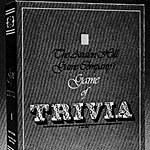
Avalon Hill
Released: 1984
Price $30
Complexity: Intermediate
Solitaire: None
*** 1/2
The Avalon Hill Game Company's Game of Trivia provides the enthusiast with a chance to demonstrate knowledge of movies, television, literature, history, music, sports, and science. The objective of the game is to be the first to graduate from Trivia Tech. Graduation requires the player first to travel about the board gathering points for correct answers to trivia questions. Then, when enough points are amassed, the final exam must be passed by answering successive questions from the player's selected major and minor schools of study.
The questions are entertaining, but too difficult for my taste (about twice as hard as Trivial Pursuit). The strategy is limited, and there are a few nitpicking problems that should be cleaned up in so expensive a game. But, overall, the Avalon Hill Game Company's Game of Trivia is a winner and will remain fresh and fun through many replays.
The rules for the game are written on a single piece of paper, organized for ease of quick reference, and straightforward enough so that play can begin almost as soon as the box is opened. The game board has an outer and inner track divided into color coded spaces to match the six schools of knowledge in Trivia Tech: 1) movies and famous products, 2) history, 3) science, 4) sports, 5) literature and music, and 6) television and comics.
Each player begins as a freshman and moves a pawn clockwise around the outer track according to the roll of the die. Depending on the location of the pawn, the player attempts a question from one of the six categories. In addition to the color-coded spaces, there are several spaces labeled Deans Office which return the pawn to the starting point and allow the other players to choose the question category.
A correctly answered question earns the player one point and advances his scoring chip one space along the scorecard located at the center of the board. Incorrectly answered questions are attempted by the other players starting with the one with the lowest score.
At freshman level, the strategy is limited to kissing the die and praying for an easy question.
After correctly answering five questions, a player achieves sophomore status. Sophomores may travel either clockwise or counterclockwise around the outer track. This allows some modest control in selecting the question category to avoid the dreaded Dean's Office.
Junior standing is attained upon correctly answering nine questions. A junior may travel either direction on the outer track and clockwise on the inner track. A junior must also declare a major and minor. The inner track has spaces labeled Major, Minor , and Elective in addition to the colored spaces designating the different schools. when the pawn lands on Major or Minor, the player attempts a question from the chosen category. When the pawn lands on Elective, the player may select any school except the major and minor.
Matriculation into the senior class requires 13 correct answers and allows movement in either direction on both tracks. Answering 16 questions qualifies the player for the final exam. Once qualified for the final exam, the player's turn consists of attempting one question each from major and minor schools. Answering both questions correctly wins the game.
This game has two clever innovations. First, the reward of increasing pawn control with each class promotion gives a sense of accomplishment as each player rises toward graduation. And, second, the selection of major and minor schools of study allow competitive play between people of vastly different backgrounds and interests.
There are, however, some small but annoying problems that prevent full enjoyment of this game. The brown and black pawns and the matching scorekeeping chips are difficult to distinguish, making misplays a strong possibility. The spaces on the scorecard at the center of the board are too small to hold even two scorekeeping chips without overlap. And, trips to the Dean's Office come up far too frequently for the helpless freshmen.
But, by far, the most irksome trouble is the questions that have somehow found their way into the wrong category. Imagine taking the final exam with a major in sports and a minor in science, and the following two questions come up: "Early in his big-band career, Xavier Cugat played a violin in whose band?" and "What labor leader said, 'He who tooteth not his own horn, the same shall not be tooted'?" I went through a number of cards, using sports as a test category, and found that an average of one question in seventy was misfiled.
In spite of these problems, The Avalon Hill Game Company's Game of Trivia is an enjoyable experience and a sure bet to provide fans of insignificant information many hours of entertainment.
More Adult Game Reviews
-
Game Review: Advance to Boardwalk: Game of High Rises and Fast Falls
Game Review: Junta: "Banana Republic" Politics
Game Review: Sovereign of the Seas: Clipper Ship Commerce
Game Review: Avalon Hill Trivia: Set 1
Back to Table of Contents -- Game News #6
To Game News List of Issues
To MagWeb Master Magazine List
© Copyright 1985 by Dana Lombardy.
This article appears in MagWeb (Magazine Web) on the Internet World Wide Web.
Other military history articles and gaming articles are available at http://www.magweb.com